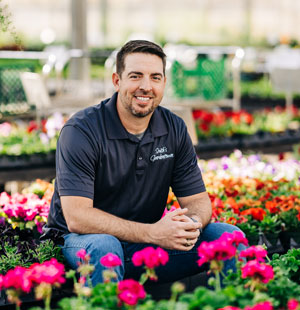6/1/2023
Creating Year-Round Gardening Interest
Jennifer Polanz

I’m happy and honored to introduce this year’s Green Profit/The Garden Center Group Young Retailer Award nominees. As always, it was difficult to narrow the field to three, but we did it, and I think you’ll be able to see why we chose these three after reading their essays. These have been edited for space. If you like what you read here, then be sure to join us at Cultivate’23 in Columbus at the Unplugged Event starting at 8:00 p.m. at GasWerks, 487 Park Street. We’ll be announcing our winner around 8:30 p.m.!
Meet the 2023 Judges:
• Bill McCurry—Green Profit columnist and owner of McCurry Associates consulting firm
• Kate Terrell—Owner/President of Wallace’s Garden Center in Davenport, Iowa (and a former YRA nominee)
• Danny Summers—Executive Director of The Garden Center Group
• Ashleigh Munro—Garden Center Coordinator at Kiwi Nurseries in Acheson, Alberta, Canada and 2022 YRA Winner

Samuel Di Rito
Age: 28
Title: Assistant Manager/Social Media Manager
Operation: Collier’s Greenhouse and Garden Center, Jackson, Georgia
Question: Horticulture is often viewed as a seasonal industry. While some seasonality is unavoidable, how might the industry shift to be present in a consumer’s mind all year long? Please offer some examples of what you’d like to see and/or what your operation is doing now.
The horticulture industry is often associated with seasonal ups and downs, but it’s possible to maintain a year-round presence in the minds of consumers. With the advent of social media and the ease of mass communication, it’s easier than ever to keep your brand and name in the forefront of customers’ minds all year long. Keeping your name the focus is key to keeping customers returning not only year after year, but season after season. At Collier’s Greenhouse, we strive to be the first business a customer thinks about regarding plants and gardening. I wholeheartedly endorse this approach.
Our commitment to grow the majority of our annuals, perennials and vegetables sets us apart from other retail establishments that buy in plant material from growers. Moreover, our year-round availability enables us to maintain and expand our loyal customer base. During the autumn or colder season, when planting is not at the center of most people’s minds, we offer an exceptional selection of fall and winter plants, including popular favorites such as pansies and mums for vibrant colors, a comprehensive range of fall vegetables and fruit trees, and one of the most unique assortment of houseplants in the state of Georgia, such as rare philodendrons and hoyas. We’re dedicated to engaging, encouraging and educating our customers throughout the year. We believe that these efforts are crucial in acquiring and retaining a loyal customer base that recognizes us as the go-to destination for all their planting needs.
From the very beginning of the customer acquisition and retention process, we utilize our social media platforms to engage with our valued customers. This practice is of utmost importance, particularly during the spring season when customers are highly active in preparing their gardens and landscapes. Our approach involves not only posting captivating pictures and videos, but also actively responding to queries both online and in-person. Taking the time to address customer inquiries is a crucial aspect that distinguishes independent garden centers from big box stores. We take pride in our engagement strategy and have received positive feedback from our valued customers, thanking us for our efforts in interacting with them. Personally, I’m of the opinion that my knowledge has significantly expanded as a result of answering these questions and engaging with our customers.
I’m continually astounded by the number of individuals who recall my name and the time I’ve devoted to assisting them in the purchasing process. It’s imperative to establish a rapport with one’s clients. As President Teddy Roosevelt once stated, “People do not care how much you know until they know how much you care.” I strive to acquire as much information as possible during conversations with customers to offer the most suitable recommendations. I firmly believe that this is appreciated by the customer and that they’ll remember the assistance provided when they’re ready for future purchases.
During the off-season, it’s not uncommon for days to be cold, dark or rainy, prompting customers to seek refuge indoors, away from the harsh elements. However, it’s important to note that this shouldn’t be perceived as a negative for any business—particularly in today’s world of social media. As the leader of our social media program, I’ve discovered that this is an opportune time to remind our valued customers that brighter days are ahead. We take great care in sharing our successful plant varieties or new additions that have thrived in the spring, with the aim of encouraging our customers to try them out in the upcoming season, thereby boosting sales.
We’ve discussed and identified a key aspect that can help in dampening the seasonality of our business. Education is the key to achieving this goal. We plan to implement more educational programs that will teach our customers how to plant and grow the biggest and best vegetables or flowers. We intend to use all available means to educate our customers, including social media, workshops and informational sessions in our heated greenhouse. We’d also like to invite more school groups and civic organizations, such as the local garden clubs, for lessons and question-and-answer sessions. This will not only help our customers, but also get them familiar with our location. It’ll also allow us to provide more one-on-one time, which we believe is essential for our customers, that we can’t provide during the spring rush. We firmly believe in this plan and know it’ll be beneficial for our business and customers. As previously mentioned, the recent surge in popularity of rare houseplants has not only necessitated our acquisition of knowledge about new varieties, but also our dissemination of that knowledge to our valued customers.
Another aspect of education that we were able to utilize during the autumn and winter months of the previous year was the explanation of our off-season preparations for the upcoming spring growing season. Many of our customers aren’t aware of the intricate details of the behind-the-scenes processes by which a plant is grown from a seed or a cutting into a beautiful plant that’s ready for planting. This year, we showcased some of our beautification, remodeling and facility upgrade projects, which included a fresh coat of paint, new exterior siding and upgraded irrigation systems, all of which were implemented to better serve our customers as we welcome them back in during the busier times.
While some seasonality in horticulture is unavoidable it can be dampened significantly with just a few steps and dedication to strive to always improve. Engagement, encouragement and education are key elements that should be implemented to every industry, not only horticulture, while focusing on improving the customers’ whole buying experience throughout the year.

Michael Fiore
Age: 34
Title: Vice President
Operation: Smith’s Gardentown, Wichita Falls, Texas
Question: Horticulture is often viewed as a seasonal industry. While some seasonality is unavoidable, how might the industry shift to be present in a consumer’s mind all year long? Please offer some examples of what you’d like to see and/or what your operation is doing now.
Selling plants in the spring is easy. After being cooped up all winter, customers are so eager to garden, the plants essentially sell themselves. Anyone who can put halfway-decent-looking plants out on tables will have spring revenue. However, spring revenue doesn’t guarantee success and longevity in this industry. As my grandfather used to say, “Anyone can make money in the spring; the key is to not lose it all the rest of the year.”
While revenue fluctuates wildly, expenses travel at a much more steady pace. Like the tortoise and the hare, revenue may leap out to a strong and fast lead, but then weather can turn sales cold in an instant. Meanwhile, expenses keep chugging along step by step: payroll, utilities, rent, taxes, accounts payable … repeating month after month. While there are some expenses that can be reduced, overhead never gets eliminated.
It just keeps on moving. So how can we keep our hare from tiring out and getting passed up by the tortoise? We have to find creative ways to bring in quality revenue even during the traditionally slower times of the year.
Let’s think about the investing world for a moment. Economic downturn? The biggest winners are the ones that buy real estate and stock as it bottoms out. While everyone else is selling, they’re buying! So how does that relate to our industry? All of your competition will be running ads during the springtime, but very few, if any, will be willing to spend advertising budget during winter. This means that during the spring, the market is going to be extremely oversaturated with commercials and social media ads. It’s hard for your business to get center spotlight in a market like that. However, smart garden centers can make a huge impact for less dollars by advertising during the off-season.
So what is there to talk about when it’s winter time? Hello? We have greenhouses! We turn winter to spring every day! Talk about how your business starts the growing process in January and February in order to have plants ready by April and May. Show what sets you apart—quality, service and expertise! Make a push with your social media. It doesn’t have to be fancy. Set your phone on a tripod and show a time-lapse of cleaning and sanitizing your greenhouse benches. Talk about the importance of starting with a clean slate to reduce pest and disease pressure for the future crops. Video marketing is extremely effective at reaching people of all ages and it’s cheap to produce. The best part about this is you actually have time in the winter to create and edit videos without being overrun with the busyness of spring. With effective marketing in the off-season you can add hundreds or even thousands of new followers who’ll already be tuned in once springtime does come around.
Make a push for houseplants. Plant people (your customers) are getting more and more creative about how to fit more plants inside of their homes. The use of plant shelves, cabinets and grow lights has grown exponentially since 2020. Talk about the important health benefits that indoor plants can provide. Educate by showing the best growing practices. The last few years have been record-setting years for houseplant sales and there’s money to be made in this sector. Bring fresh shipments of houseplants in during those traditionally slower times for outdoor gardening. You’ll enable people to get their “plant fix” during those times when the weather outside is less than ideal.
Another one of the most important things you can do to drive revenue during the off-season is to offer workshops and seminars. Your customers are looking for excuses to get out of the house during those cold winter months, so give them some. Turn empty greenhouses into classrooms where people can learn, create and build. Workshops that emphasize make-and-take projects and seasonal crafts are always popular for adults or can even be geared towards families with children.
Speaking of returning customers, an easy way to have customers visit time and time again is by offering up design services. Let your customers know they can book design consultations with you or someone on staff for a limited timeframe outside of peak seasons. Charge for your time. Create some urgency by saying you only have a certain amount of time slots available for these consultations. We prefer doing these consultations in the store. Have people bring pictures and measurements in with them and have an idea about sun exposure and what kind of style they like. Charge higher than what you think you should. You can always offer to include a gift card with the consultation as an added incentive to purchase all of the plants from you when it’s time to do the planting.
Lastly, I would stress the importance of learning how to work ON your business rather than IN your business. For most business owners and managers, the default is to work in your business, and when you do, you’re easily sidetracked by the tyranny of the urgent issues that never cease to arise. You need to step away at least once a month and get out of your store where the “urgent” issues have a hard time reaching you. Go to conferences, attend webinars, read trade magazines, have lunch with local entrepreneurs or visit stores in another town that are similar to yours. Inspiration will happen when you’re outside of your store and free to focus on high-level strategy rather than the low-level busy work. You’ll encounter incredible life-changing and business-altering ideas by having a regular cadence of stepping away from your business busyness.

Emily Kellett
Age: 32
Title: Co-owner & Founder
Operation: STUMP LLC, Columbus, Ohio
Question: Horticulture is often viewed as a seasonal industry. While some seasonality is unavoidable, how might the industry shift to be present in a consumer’s mind all year long? Please offer some examples of what you’d like to see and/or what your operation is doing now.
The ability to bring joy to peoples’ lives throughout the year is one of the many aspects I love about our industry and what we do at STUMP. When dreaming up the concept for our store, we were very aware of the seasonality of the horticulture industry. From the beginning, we knew we wanted to build a plant-focused retail store that would be relevant and enticing for consumers year-round. The passionate plant person who shops with us is someone who might enjoy outdoor gardening in the spring and summer months, but why should that fun end? By leaning on houseplants, fostering plant-loving communities and thinking creatively about incorporating plants into our lives throughout the year, retailers will be able to reliably bring customers back into their stores no matter the season.
First thing’s first: carry a healthy, rotating variety of houseplants year-round. Houseplants are the one category of plants that are relevant year-round regardless of which zone a customer lives in. Anyone who has an indoor space with a window can have success with a houseplant. ZZ plants and snake plants are staples that we always keep stocked in our stores because they’re easy to care for and ideal for first-time plant buyers. Houseplants provide a gateway to introduce “non-green thumbs” to the world of plants and gardening by building their confidence in their own green thumb, one success at a time. I’ve yet to meet a person who’s had success with one plant and never bought another. And this excitement is soon transferred to their family and friends.
Furthermore, houseplants have the ability to financially carry retailers through the off-season, while providing our customers the same joy they experience gardening outdoors. During winter months, focus on creating a lush and cozy tropical plant section in your retail store or garden center where you can invite customers in to spend time with the plants. All it takes is a few bird of paradise and a prince of orange philodendron to create instant tropical vibes. Take a photo of the tropical display to post on social media to invite customers to come and spend time in the lush environment. We sell many large ficus trees, bird of paradise and colorful philodendrons during the winter to those who are missing the comfort of greenery and looking to create their own oasis at home.
During fall months host workshops for your plant-loving community. Plants bring people together. We’ve found that the best time of the year to host workshops is in the fall. When the weather starts to turn cold and summer activities come to an end, in-store workshops offer an opportunity to bring people together to laugh, learn and get their hands in the soil. We offer a variety of hands-on educational ticketed workshops in the fall, including moss pole building, terrarium building, stag horn fern mounting, Houseplants 101, etc. We’ve found that hosting fall workshops helps our shops balance out the lack of sales due to football games and other weekend events that reduce our weekend traffic. Take the workshop a step further and pass out a 10% off discount card at the end to encourage customers to come back and explore your indoor plant offerings during the winter.
During summer months leave the comfort of your garden center or store and bring some plants with you! This is an ideal time to get out into your community and participate in farmers markets, flea markets, festivals, pop-ups shops and community events. When we participate in these types of events, we pack up a selection of our best plants, planters and plant accessories that represent our store well. When people ooh and ahh at the beautiful plants, we let them know that there’s much more to see when they visit our retail store.
Ideas for the future: One goal I have for our stores is to offer custom pottery in seasonal colors throughout the year. Since we specialize in indoor plants, many of our customers use houseplants as a way to enhance their home décor. As the seasons change, we’ll focus on stocking planters that mimic the colors and tones of the season. Just as the fashion and home decor industries offer new collections and colors each season, we look at planters as a type of “fashion” for our plants that can be changed with the seasons. We offer repotting services in-store to make the process of changing planters as easy and seamless as possible for our customers, while this also functions as a great revenue source as people upsize their planters.
Another goal is to explore other ways to bring nature indoors, beyond houseplants. Lately, we’ve noticed our younger customers are interested in growing edible mushrooms, such as lion’s mane and oyster mushrooms. I see this as an interesting category for our industry to explore in the coming years. I’ve only scratched the surface, but I’m excited to explore ways we can incorporate mushrooms, other fungi, moss and beyond into our offerings in the future.
In the last few years, we’ve been very happy with the variety of new houseplants being grown and with the ability of growers to keep up with demand, while also moving quickly to keep up with changing plant trends. If growers keep up this momentum through maintaining plant quality and a wide variety of crops and retailers continue to foster the love of plants within their local communities, I see a very exciting future for our industry in the coming years: a place where plants and plant care plow past the “trend” category and land in the category of mainstream necessities that provide and enhance a joyful way of life for all, no matter the season. GP
